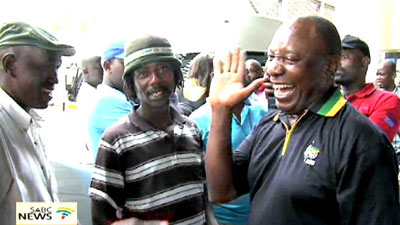African National Congress (ANC) deputy president got the majority of nominations to become leader of the ruling African National Congress, but the complexity of the leadership race means it’s far from certain he will become the next party leader and therefore the likely next president. Cyril Ramaphosa won around 55% of nominations from the party branches that will send delegates to an ANC conference this month. His main rival, Nkosazana Dlamini-Zuma, got most of
the rest, according to a Reuters tally.
A majority of nominations, however, is not the same as the most votes at the conference, which analysts say is a two-horse race between Ramaphosa and Dlamini-Zuma, a former cabinet
minister and ex-wife of President Jacob Zuma.
The ANC’s electoral dominance means whoever wins the party’s top job is likely become the next president of South Africa.
Ramaphosa is considered the most market-friendly candidate, and signs his campaign is doing well have driven a rally in South African assets in recent weeks. But determining who will become ANC leader is still an inexact science. Depending on the size of their membership, ANC branches from the country’s nine provinces will send different numbers of delegates to the conference, which opens on Dec. 16. Each branch gets one delegate for its first 100 members, with another delegate added for every additional 250 members.
Dlamini-Zuma has tended to win more nominations in provinces with larger ANC branches, but there is no verifiable way of calculating the number of delegates that candidates will have on
their side at the conference. And in any case, delegates are not bound to vote for the candidate their ANC branch nominated.
Frans Cronje, chief executive of the Johannesburg-based Institute of Race Relations, estimated delegate support for Ramaphosa at the conference could vary from 50 percent to 60
percent, depending on the assumptions made. Those assumptions include the ratio between branch nominations and delegates and whether the kingmaker province of Mpumalanga – the second-largest in terms of ANC membership, which is on the fence – sides with Ramaphosa or Dlamini-Zuma. “The data we have point to a Ramaphosa victory, yet we are hesitant to call the race in his favour,” Cronje said.
ZUMA’S INFLUENCE?
Adding another level of complexity, the nominations tally is still being revised. Some disgruntled ANC members have launched court cases and some branches are re-running the meetings where
nominations for party leader are made.
On Tuesday, officials in KwaZulu-Natal province – which will send the most conference delegates – published revised voting data that gave 21 additional nominations to Dlamini-Zuma, who
has majority support from the area.
How the roughly 5,000 delegates will vote is also subject to vote-buying and intimidation – which are widely acknowledged to have swayed previous leadership contests but whose influence is
difficult to quantify.
Branches account for 90 percent of the conference delegates. The remainder comes from the ANC’s women’s, youth and veterans leagues, as well as a handful of provincial ANC officials.
It is unclear exactly how the leagues will vote, though the leaders of the youth and women’s leagues have publicly backed Dlamini-Zuma.
Finally, Ramaphosa has to contend with incumbent leader Zuma’s control of large sections of the ANC, and Zuma has backed the candidacy of Dlamini-Zuma.
“Zuma can still deliver victory to Dlamini-Zuma,” said independent political analyst Ralph Mathekga. “He controls the levers of the party and can influence how delegates vote.”
>
Author
-
Multimedia Manager at SABC News · Wits - University of the Witwatersrand


